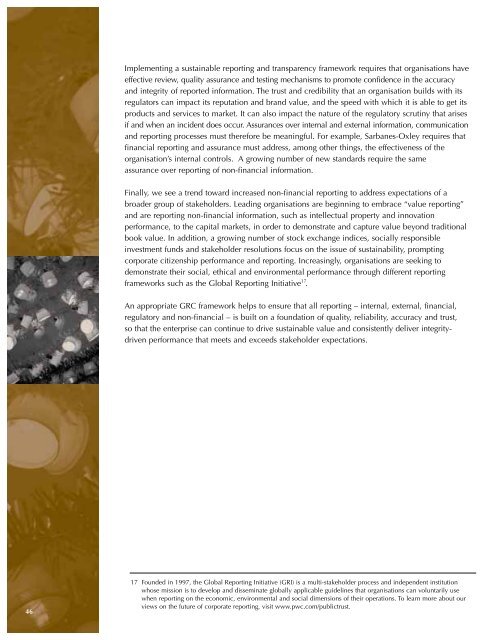Integrity-Driven Performance. New Strategy for ... - GRC Resource
Integrity-Driven Performance. New Strategy for ... - GRC Resource
Integrity-Driven Performance. New Strategy for ... - GRC Resource
You also want an ePaper? Increase the reach of your titles
YUMPU automatically turns print PDFs into web optimized ePapers that Google loves.
Implementing a sustainable reporting and transparency framework requires that organisations haveeffective review, quality assurance and testing mechanisms to promote confidence in the accuracyand integrity of reported in<strong>for</strong>mation. The trust and credibility that an organisation builds with itsregulators can impact its reputation and brand value, and the speed with which it is able to get itsproducts and services to market. It can also impact the nature of the regulatory scrutiny that arisesif and when an incident does occur. Assurances over internal and external in<strong>for</strong>mation, communicationand reporting processes must there<strong>for</strong>e be meaningful. For example, Sarbanes-Oxley requires thatfinancial reporting and assurance must address, among other things, the effectiveness of theorganisation’s internal controls. A growing number of new standards require the sameassurance over reporting of non-financial in<strong>for</strong>mation.Finally, we see a trend toward increased non-financial reporting to address expectations of abroader group of stakeholders. Leading organisations are beginning to embrace “value reporting”and are reporting non-financial in<strong>for</strong>mation, such as intellectual property and innovationper<strong>for</strong>mance, to the capital markets, in order to demonstrate and capture value beyond traditionalbook value. In addition, a growing number of stock exchange indices, socially responsibleinvestment funds and stakeholder resolutions focus on the issue of sustainability, promptingcorporate citizenship per<strong>for</strong>mance and reporting. Increasingly, organisations are seeking todemonstrate their social, ethical and environmental per<strong>for</strong>mance through different reportingframeworks such as the Global Reporting Initiative 17 .An appropriate <strong>GRC</strong> framework helps to ensure that all reporting – internal, external, financial,regulatory and non-financial – is built on a foundation of quality, reliability, accuracy and trust,so that the enterprise can continue to drive sustainable value and consistently deliver integritydrivenper<strong>for</strong>mance that meets and exceeds stakeholder expectations.4617 Founded in 1997, the Global Reporting Initiative (GRI) is a multi-stakeholder process and independent institutionwhose mission is to develop and disseminate globally applicable guidelines that organisations can voluntarily usewhen reporting on the economic, environmental and social dimensions of their operations. To learn more about ourviews on the future of corporate reporting, visit www.pwc.com/publictrust.



